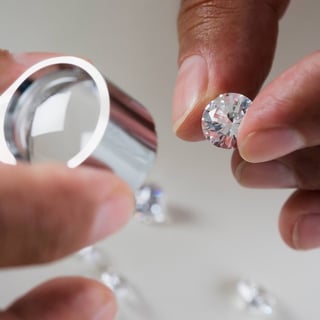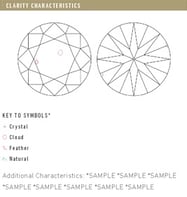When you look at a diamond, its beautiful light performance and sparkle hypnotize you making you forget about everything else. But if you stare at it really carefully you will find out that there is more than meets the eye inside this appealing brilliant.

Under magnifying glasses, or sometimes even to the naked eye, diamonds present their inner imperfections called inclusions and their surface marks called blemishes. These small imperfections are formed during the natural process of the diamond and can be noticed as tiny crystals, clouds, feathers, carbons and others. When we refer to these defects, we are talking about the clarity of the diamond, which can lower the value of the stone depending on how easy it is to detect them.
Extremely pure diamonds, such as the ones considered Flawless, are very expensive and hard to find. The majority of diamonds have inclusions, the important thing about this aspect is to find the ones with imperfections positioned in places that are not very visible and that still allows the light to travel through all the diamond.
To grade them they consider the visible total of inclusions, color, and other aspects perceived under magnifying glasses of 10x. According to GIA, the clarity is classified as:
| Grade | Meaning (Under a 10x magnifying glass) |
| FL - Flawless | The diamond is pure and have no inclusions or blemishes to 10x. |
| IF - Internally Flawless | There are no inclusions but blemishes are detected to 10x. |
| VVS1, VVS2 - Very, Very Slightly Included | The diamond has inclusions that are pretty hard to detect to 10x. |
| VS1, VS2 - Very Slightly Included | Inclusions can be detected easily to a 10x but not to the naked eye. |
| SI1, SI2 - Slightly Included | It's inclusions can be detected even to the naked eye, more in a SI2. |
| I1, I2, I3 - Included | It's inclusions are easily detected to the naked eye. They are even more noticeable if they are I2 or I3 |
 To set the grade of the clarity through their reports, GIA Laboratory include a Diamond Plot where they add a diagram of the diamond seen from the top with a graphic representation of the position and type of inclusions it has, just like the image on the left.
To set the grade of the clarity through their reports, GIA Laboratory include a Diamond Plot where they add a diagram of the diamond seen from the top with a graphic representation of the position and type of inclusions it has, just like the image on the left.
If you are looking for some advice about the clarity keep in mind that it can affect the sparkle of the diamond and its appearance, so you have to consider it pretty well. If you are going to buy one you should know that the VS1 and VS2 are the most popular since they are clean to the naked eye and its price is reasonable, but if you are into something the closest to pure try a VVS1 - VVS2.
If you are more interested into the carats or color than the clarity, you can sacrifice a little bit more of this characteristic to give more importance to the others. You can try to catch up a good SI1 - SI2, not so easy-to-find inclusions but giving you the chance to increase the size, just remember it is easier to detect inclusions in larger diamonds. We recommend our clients to buy eye clean diamonds between VS2-SI2. Contact us and we can help you find the best deals available.
It is all a matter of decisions when it comes to defining your ideal diamond, you must prioritize the characteristics of what you want so set your 4Cs wisely to make a good choice. To learn more about diamonds click here.
Any doubts? Contact our diamond experts for more information!
 The best quality at the best price
The best quality at the best price 